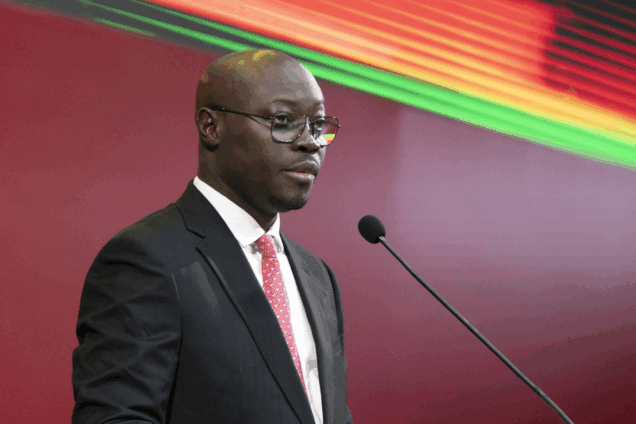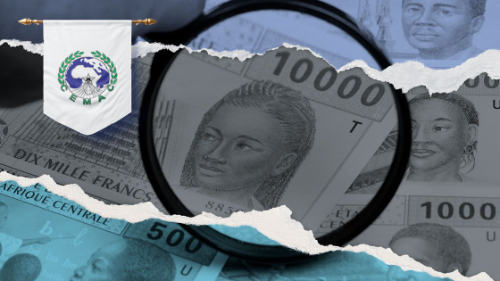Ghana's Fiscal Future on the Line: Dr. Ato Forson Unveils Explosive 2026 Budget with Tax Overhaul

Ghana's Finance Minister, Dr. Cassiel Ato Forson, is set to present the 2026 Budget Statement and Economic Policy to Parliament, a pivotal moment that will outline the government's strategy to consolidate the nation’s fragile economic recovery while addressing growing public demand for relief and renewed growth. For many Ghanaians, this budget transcends a typical fiscal exercise, serving as a critical test of the government’s ability to maintain economic stability, meet debt commitments, and deliver tangible benefits across jobs, infrastructure, and social protection.
Dr. Forson faces the intricate challenge of balancing fiscal consolidation with economic growth. His presentation is anticipated to be anchored on three primary objectives: maintaining stability, enhancing revenue mobilization, and fostering inclusive development. Leveraging his extensive experience as a former deputy finance minister and his current role in navigating a complex post-debt-restructuring period, Dr. Forson is renowned for his deep understanding of fiscal metrics and preference for credible, data-driven projections. Analysts expect the statement to feature realistic targets for growth, inflation, and the fiscal deficit, coupled with clear policy measures aimed at guiding Ghana onto a sustainable economic trajectory. The 2026 budget will be meticulously scrutinized for indications that the government can effectively manage limited fiscal space without undermining recent advancements in exchange rate stability and inflation control.
On the revenue front, a significant constraint on Ghana's fiscal performance, new measures are expected. While expenditure cuts have been a consistent practice in recent years, domestic revenue growth has lagged behind projections. The budget is therefore expected to detail new revenue initiatives, potentially including the expansion of the tax net, enhanced compliance enforcement, and digital taxation reforms. Notably, the Finance Minister is set to announce a reduction in the effective VAT rate for businesses starting next year, alongside a major review of the country’s tax laws. There are strong indications that the COVID-19 Levy will be scrapped. Analysts describe these changes as a “total revamp” of Ghana’s tax laws, reminiscent of the comprehensive reforms implemented between 2013 and 2016. These strategic adjustments are part of the government’s broader plan to simplify the tax regime, improve compliance, tackle administrative inefficiencies, plug revenue leakages, enforce existing laws, and digitize revenue collection, rather than imposing broad-based tax hikes on already strained citizens and businesses.
Regarding expenditure, Dr. Forson is expected to reaffirm the government’s steadfast commitment to protecting spending in crucial sectors such as education, health, and social protection, which directly impact livelihoods and command significant public interest. Job creation will likely remain a central theme, with renewed emphasis on supporting Small and Medium-sized Enterprises (SMEs), manufacturing, and agriculture as key drivers of employment. Infrastructure projects, particularly those related to roads, water, and energy, are also expected to feature prominently, albeit within a more disciplined financing framework. To tighten expenditure controls for the upcoming year, the Minister is expected to propose a review of the Public Financial Management Act, complemented by improvements to the Ghana Integrated Financial Management Information System (GIFMIS), to better manage the country’s debt levels. The 2026 Budget will also highlight ongoing government initiatives such as the ‘Big Push’ and the ‘24-Hour Economy’ programme, outlining their expected contributions to economic expansion and job creation.
The 2026 budget also serves as an important progress update for Ghana’s development partners, including the International Monetary Fund (IMF), which continues to underpin the country’s fiscal recovery efforts. Dr. Forson is expected to reiterate the government’s commitment to the IMF programme’s key benchmarks: reducing the fiscal deficit, enhancing public financial management, and maintaining transparency in debt operations. Investors and financial markets will be closely observing for a credible debt servicing strategy, particularly how the government intends to finance maturities and external obligations without resorting to excessive domestic borrowing. The perceived credibility of these plans will significantly influence investor confidence and the stability of the cedi in the months ahead. Dr. Forson is likely to emphasize how the current administration has prudently managed the economy and maintained fiscal discipline, while outlining plans for the post-IMF-supported programme period, potentially taking a more moderate stance on Ghana’s macroeconomic targets for 2026.
For ordinary Ghanaians, the paramount concern remains the cost of living. Many will be looking for measures designed to cushion the effects of inflation and provide economic relief, whether through subsidies, targeted social programmes, or direct support for small businesses. Businesses, conversely, will seek predictability: a stable macroeconomic environment, clear tax policy, and access to affordable credit. Any measures aimed at reducing arrears, simplifying tax compliance, or improving cash flow within the private sector would be warmly welcomed.
Ultimately, today’s budget presentation will test not only the government’s policy direction but also its overall credibility. Dr. Forson must convince Parliament, investors, and the general public that his figures are sound and that his plans are both realistic and achievable. Beyond the statistics, Ghanaians will be listening for assurance that the government genuinely understands their daily struggles. The tone and substance of the presentation will determine whether this budget is perceived merely as another technical document or as a genuine roadmap for shared recovery. As the Finance Minister addresses Parliament, the nation will be anticipating more than just numbers; Ghanaians expect a message of discipline, hope, and clear direction—demonstrating how stability can coexist with opportunity, and how fiscal prudence can deliver tangible progress.
You may also like...
When Sacred Calendars Align: What a Rare Religious Overlap Can Teach Us

As Lent, Ramadan, and the Lunar calendar converge in February 2026, this short piece explores religious tolerance, commu...
Arsenal Under Fire: Arteta Defiantly Rejects 'Bottlers' Label Amid Title Race Nerves!

Mikel Arteta vehemently denies accusations of Arsenal being "bottlers" following a stumble against Wolves, which handed ...
Sensational Transfer Buzz: Casemiro Linked with Messi or Ronaldo Reunion Post-Man Utd Exit!

The latest transfer window sees major shifts as Manchester United's Casemiro draws interest from Inter Miami and Al Nass...
WBD Deal Heats Up: Netflix Co-CEO Fights for Takeover Amid DOJ Approval Claims!

Netflix co-CEO Ted Sarandos is vigorously advocating for the company's $83 billion acquisition of Warner Bros. Discovery...
KPop Demon Hunters' Stars and Songwriters Celebrate Lunar New Year Success!

Brooks Brothers and Gold House celebrated Lunar New Year with a celebrity-filled dinner in Beverly Hills, featuring rema...
Life-Saving Breakthrough: New US-Backed HIV Injection to Reach Thousands in Zimbabwe

The United States is backing a new twice-yearly HIV prevention injection, lenacapavir (LEN), for 271,000 people in Zimba...
OpenAI's Moral Crossroads: Nearly Tipped Off Police About School Shooter Threat Months Ago
ChatGPT-maker OpenAI disclosed it had identified Jesse Van Rootselaar's account for violent activities last year, prior ...
MTN Nigeria's Market Soars: Stock Hits Record High Post $6.2B Deal

MTN Nigeria's shares surged to a record high following MTN Group's $6.2 billion acquisition of IHS Towers. This strategi...





